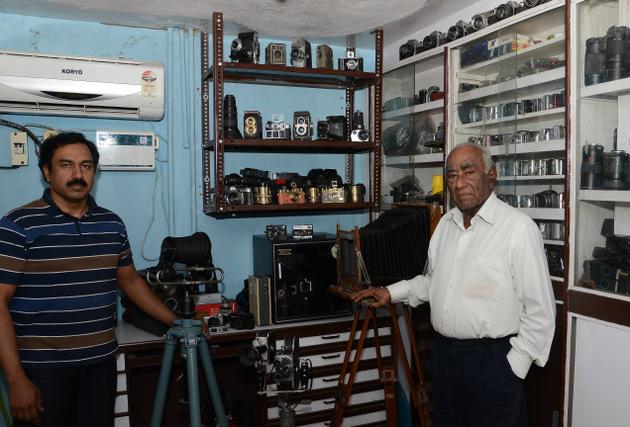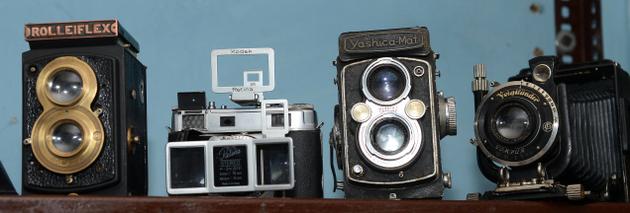
Spanning nine decades, Camera Crafts in the city has been a witness to the evolution of the photo industry
An auto screeches to a halt. A man gets down and walks in carrying a camera. Many customers have already settled into the backless seats at the store, and more filter in with cameras. Mohammed Aquil is busy shuffling in and out of his workshop at the back. Such scenes have remained unchanged at Camera Crafts in Triplicane for many years now. But what hasn’t changed is how the store has continuously adapted itself to the evolution of the photo industry.
Mohammed Abdul Sattar set up a camera repair shop in Triplicane in 1925 since there was nothing of that sort anywhere in the vicinity. “We were among the first in the Presidency,” says Aquil, as he wipes lenses carefully and places them aside. “My grandfather was good with carpentry and so, we started manufacturing wooden field cameras soon,” says Aquil, beside whom is a model of an old wooden camera with adaptable zoom lens.
For studios
Aquil says that his grandfather had told him how most of Camera Crafts’ customers back then were studios or wealthy locals who wanted their cameras repaired. Another aspect that Aquil remembers is Sattar narrating how military personnel visited the store during World War II. “Apparently, we were the only shop here then, so my grandfather would tend to all their cameras as well.”
When Sattar passed away in 1969, Aquil’s father Mohammed Abdul Latheef took over the business — just after the era of wooden cameras and at the beginning of the mechanical era. In keeping with the store’s tradition, he manufactured enlargers, studio lights and single-bulb flashes.
“Before the era of digital prints, one would need an enlarger to zoom images, and so my dad was making those. At one point, my father manufactured about 40,000 single-bulb flashes for studios such as Choksi Brothers spread across the country,” he says. And when electrical flashes became the norm, Aquil’s father decided to create sockets in older cameras to fit flashes. “He made those pre-War cameras compatible with flash,” he says.
In 1988, Aquil himself joined the shop, after completing a degree in electrical engineering. “We had a factory right here, which we demolished in the late 1980s. We moved the shop to a small one-room setup in the street opposite and functioned out of there for some time. Now, we have stopped manufacturing machines or cameras, and stick to just servicing. A lot of studios, professional and wildlife photographers continue to come here since we have been around for long.” He does sell cameras but not too many. “I mostly sell professional models.”

However, he does have a large collection of cameras. “So many cupboardfuls,” he laughs. “Maybe 500 or even more.” Among the old cameras in his collection are the wooden field cameras his grandfather made — Leica and Rolleiflex. “A lot of them are pre-War cameras. I’m trying to restore as many as possible,” he adds. “Recently, I sold six cameras to a tourist who was looking for antiques. I just opened the cupboard and asked her to pick whatever she wanted.”
Camera Crafts has no visiting card. “Whatever customer base I have built is purely through word-of-mouth,” he smiles. “You can see for yourself.” Sure enough, more customers walk up to the counter with cameras.
source: http://www.thehindu.com / The Hindu / Home> Features> MetroPlus / by Anusha Parthasarathy / Chennai – February 06th, 2014